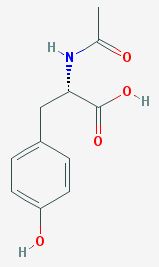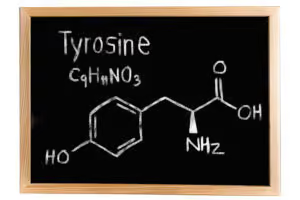Table of Contents
N-Acetyl L-Tyrosine (NALT or NAT) is a highly bio-available form of the amino acid L-Tyrosine. Your brain uses the enzyme tyrosine hydroxylase to convert L-Tyrosine into L-DOPA. Decarboxylation of L-DOPA results in synthesis of the neurotransmitter dopamine.[i]
Once converted into dopamine, the enzyme dopamine-beta-hydroxylase converts it into the neurotransmitters norepinephrine (noradrenaline) and epinephrine (adrenaline). This triad of neurotransmitters are collectively referred to as “catecholamines”.
N-Acetyl L-Tyrosine can be a highly effective nootropic for boosting cognitive function. And is particularly helpful in maintaining cognitive performance when you’re under practically any kind of stress. Including music played above 90 dB’s.
N-Acetyl L-Tyrosine works in synergy with stimulants like methylphenidate (i.e. Ritalin).[ii] Drugs like Ritalin work by blocking the reuptake of the neurotransmitters dopamine, and norepinephrine. And if there’s not enough dopamine available to do the job, Ritalin doesn’t work very well. NALT potentiates increases in extracellular dopamine.
NALT also stimulates the production of thyroid hormones T3 (triiodothyronine) and T4 (thyroxine) which are crucial in maintaining both overall physical and cognitive health.
NALT can boost libido, memory, focus, concentration, mood, offers anti-depressant effects, and improves executive function in those with ADHD.
N-Acetyl L-Tyrosine helps:
- Cognitive Stress. NALT produces the catecholamine-triad of neurotransmitters dopamine, norepinephrine and epinephrine. Sleep deprivation and extreme stressors like heat and cold can deplete catecholamine levels. NALT restores them to preserve optimal cognition.[iii]
- Neurotransmitters. NALT is a necessary precursor for dopamine, norepinephrine and epinephrine. As your dopamine levels increase, you’re better able to concentrate, organize your thoughts, and stay productive.
- Attention Deficit Disorder (ADHD). NALT can be an effective treatment for ADHD symptoms. NALT works in synergy with pharmaceutical drugs like Ritalin and Adderall by boosting extracellular levels of dopamine. Helping these drugs be more effective. And mitigating side effects like crashes when the drug wears off.
Overview
N-Acetyl L-Tyrosine (NALT) is a form of the amino acid L-Tyrosine. The addition of an acetyl group to L-Tyrosine makes it more bioavailable than supplementing with L-Tyrosine.

Your brain converts L-Tyrosine to L-DOPA which then produces the neurotransmitter dopamine. The unused dopamine is then further converted into the neurotransmitters norepinephrine (noradrenaline) and epinephrine (adrenaline). This triad of neurotransmitters are collectively referred to as “catecholamines”.
“Tyrosine” is derived from the Greek word tyros, meaning cheese. It was first discovered by German chemist Justus von Liebig in 1846 in the protein casein from cheese.
Tyrosine is considered a non-essential amino acid because it can be synthesized in your body from phenylalanine. Which is found in many high-protein foods such as poultry, fish, dairy, nuts, soy products, lima beans, avocados and bananas.
NALT enhances working memory and executive function in the prefrontal cortex. It helps with creative flow states, is fuel for inspiration, cognitive flexibility, and the kind of “convergent thinking” you do in multiple choice exams.
N-Acetyl L-Tyrosine assists in the production of thyroid hormones T3 (triiodothyronine) and T4 (thyroxine) which are crucial in maintaining both overall physical and cognitive health.
N-Acetyl L-Tyrosine (NALT) vs. L-Tyrosine: What’s the Difference?
 N-Acetyl L-Tyrosine (NALT) is the amino acid L-Tyrosine with an acetyl group added. When you take NALT as a supplement, it breaks down in your kidneys back into L-Tyrosine. So in theory, the two supplements offer the same benefits.
N-Acetyl L-Tyrosine (NALT) is the amino acid L-Tyrosine with an acetyl group added. When you take NALT as a supplement, it breaks down in your kidneys back into L-Tyrosine. So in theory, the two supplements offer the same benefits.
There is some debate in the nootropics community on which is more effective. NALT or plain L-Tyrosine. NALT is a more soluble form of L-Tyrosine so it should be more bioavailable to your body.
However, some studies report that in some cases, a sizeable percentage of supplemental NALT is excreted in urine before it’s converted into L-Tyrosine.[iv]
On a personal note, I haven’t had any issues using NALT as a source of L-Tyrosine. It gives me a dopamine and adrenal boost you’d expect from supplementing with a dopamine precursor.
When dealing with ADHD/ADD it’s particularly effective when stacked with ALCAR (Acetyl-L-Carnitine). ALCAR easily crosses the blood-brain barrier for boosting acetylcholine levels. And seems to positively influence serotonin levels. And NALT provides my brain with the dopamine it needs to mitigate symptoms of ADHD/ADD.
But in the interests of full transparency, this is stacked with 20 mg of Ritalin twice a day. Clearly, my brain doesn’t have the capacity to produce enough dopamine on its own. And needs the boost that comes from supplementing with NALT.
So like all nootropics, YMMV. Always take into account how each nootropic works synergistically with others in your stack. And how they work with any meds you need to take.
This is as much art as it is science. And experimentation is key for optimal cognition, and a ‘Limitless’ mindset.
How does N-Acetyl L-Tyrosine work in the Brain?
N-Acetyl L-Tyrosine boosts brain health and function in several ways. But two in particular stand out.
- N-Acetyl L-Tyrosine improves memory and cognition under acute stress. Acute stress is defined as short-term stressors that can affect cognition. Examples are extreme heat or cold. Things like cold showers, extreme sports, car accidents, relationship problems, intense movies, business deals gone awry, exams and war zones.
In one study done at the University of Bedfordshire in the UK, the effect of L-Tyrosine on cognitive performance was measured before an exercise task.
Researchers recruited 8 soccer players. And had them complete a 90-minute soccer simulation performance test in an environmental chamber set at 77 degrees Fahrenheit.
The soccer players were given either L-Tyrosine before exercise or a placebo. Cognitive performance was measured before the exercise task. Then again at “half-time”, following half time, and following the entire simulation.
The cognitive performance task assessed dual-task and vigilance. The outcome revealed that cognitive vigilance and reaction time among soccer players significantly improved following administration of L-Tyrosine.
Results showed that in warm-weather conditions, L-Tyrosine could enhance cognitive function and prevent cognitive impairment during exposure to exercise-heat stress.[v]
- N-Acetyl L-Tyrosine boosts neurotransmitters. NALT turns into L-Tyrosine once taken as a supplement. It then converts into the neurotransmitter dopamine. Dopamine is used to control movement in your body, is fundamental to memory, attention and problem solving.
The unused dopamine can then convert into the neurotransmitters norepinephrine (noradrenaline) and epinephrine (adrenaline).
Norepinephrine is important for attentiveness, emotions, sleeping, dreaming and learning.
Epinephrine drives your ‘flight-or-flight’ response. It’s what prompts your reaction to dangerous circumstances, emergency situations, or in stressful situations or environments.
In one study done in the Netherlands, researchers determined if L-Tyrosine would boost cognitive resources associated with cognitive control. They performed tests designed to measure “working memory” using the N-Back Test.
Study participants were assigned to engage in a “1-back” condition of easy difficulty and then a 2-back condition of tougher difficulty. Those that used L-Tyrosine demonstrated superior performance in the 2-back test, but not the 1-back test.
The study authors suggested that L-Tyrosine provides greater cognitive enhancement when cognitive demand increases. The bottom-line; supplementation of L-Tyrosine may help you increase your IQ score due to maximizing catecholamine reserves.[vi]
How things go bad:
As we get older, our brain and body chemistry and energy metabolism changes.
↓ Dopaminergic neurons are damaged or die
↓ Neurotransmitter levels decline
↓ Thyroid hormones decline
↑ Stress levels increase
↓ Working memory and mood decline
All of these changes are often attributed to aging. But could be a result of dietary and lifestyle choices. Unchecked, they could lead to neurodegenerative diseases like Parkinson’s, a drop in quality of life and depression.
N-Acetyl L-Tyrosine benefits
N-Acetyl L-Tyrosine (NALT) can boost levels of the neurotransmitters dopamine, norepinephrine and epinephrine. And can help a sluggish thyroid produce more T4 and T3.
 NALT can help boost cognition especially in stressful situations. It helps improve decision making, ‘flow state’ and creativity, cognitive flexibility, and working memory.
NALT can help boost cognition especially in stressful situations. It helps improve decision making, ‘flow state’ and creativity, cognitive flexibility, and working memory.
NALT converts into L-Tyrosine which then converts into L-DOPA to produce dopamine. L-DOPA is also used to make melanin in your body. This conversion process helps in the removal of neurotoxic quinones. And chelates heavy metals like mercury and lead which can accumulate in and damage neurons.
The dopamine that is not used by your brain is available to produce norepinephrine (noradrenaline) which is important for attentiveness, emotions, sleeping, dreaming and learning.
NALT can be an effective nootropic when stacked with ADHD/ADD meds like Ritalin or Adderall. It helps supply extracellular dopamine needed to improve the effectiveness of stimulants used to boost the uptake of dopamine in your brain.
How does N-Acetyl L-Tyrosine feel?
Keep in mind that NALT is a precursor to catecholamines. So if you’re not ‘low’ on dopamine, norepinephrine or epinephrine – you may not ‘feel’ anything.
Many neurohackers report a lift in mood, better focus, concentration, increased energy, and an overall sense of well-being. NALT can help re-adjust your motivation levels. It can help lower anxiety levels, especially social anxiety.
Supplementing with N-Acetyl L-Tyrosine can help bring your blood pressure down if it’s elevated from a stressful situation or environment. Take it before the stressful event if you can.
NALT helps buffer the effects of stimulants like caffeine or amphetamines. It helps potentiate and prolong the effects of Ritalin or Adderall, and reduces the crash.
If you’re into athletics or do manual work, you’ll find that supplementing with NALT before a workout or construction job will leave you feeling great afterwards. It helps mitigate many of the effects of acute stress caused by short-term stressors.
And NALT helps your body to produce melanin, so you may find it easier to get a tan while at the beach.
N-Acetyl L-Tyrosine Clinical Research
N-Acetyl L-Tyrosine to treat ADHD
Several studies have investigated using L-Tyrosine for the treatment of ADHD. One informal study published in the 1980’s determined that L-Tyrosine resulted in short-term relief from ADHD symptoms. But subjects eventually reached tolerance and a diminished effect.
This is important for neurohackers to keep in mind. It seems that NALT on its own can benefit some more than others. Regardless if your treating ADHD, or are perfectly cognitively healthy.
I’ve seen more than one report of nootropic users experiencing tolerance after just a week of supplementing with NALT. But most peer-reviewed, published studies show positive results.
One study published in Neuropsychiatric Disease and Treatment in 2011 looked at using amino acid precursors for the treatment of ADHD. Including L-Tyrosine for dopamine, and 5-HTP for serotonin.
The study used 85 young people aged 4 – 18 years old, all with a clinical diagnosis of ADHD. They were treated for an initial period of 8 – 10 weeks. Urinary samples to determine serotonin and dopamine levels were collected within the first 4 weeks. If they didn’t reach adequate levels, subjects were moved to higher dosing levels 2 and then 3 until they got relief from symptoms.
Researchers found that the dopamine and serotonin precursors yielded similar results to Strattera and Ritalin. And “the amino acid protocol may be equal in efficacy to potent, pharmaceutical ADHD medications”.[vii]
L-Tyrosine reduces blood pressure under stress
This study is particularly interesting for its nootropic application. It’s commonly understood that blood pressure rises when we’re under stress. The source of stress doesn’t really matter. Stress up = blood pressure up.
A study in Amsterdam showed that L-Tyrosine administration decreased blood pressure about 15 minutes after ingestion. This study involved assessing task performance following acute stress.
Acute stress is usually short-term and can be caused by driving, fighting, athletics, martial arts training, war, combat training, Crossfit, cold showers, loud music, intense movies, loud noises, business deals, relationships, school, exams and more.
The point is, this study is applicable to every one of us. The study found that L-Tyrosine reduced diastolic blood pressure within 15 minutes of taking the supplement. And blood pressure normalized within 1 hour.
This study tells us that L-Tyrosine (and NALT) may promote a decrease in blood pressure caused by stress. And could be used to mitigate the effects of stressful situations if taken prior to the stressful event.[viii]
N-Acetyl L-Tyrosine promotes cognitive flexibility
Cognitive flexibility applies to those who can adjust their thinking quickly to adapt to novel situations and stimuli. A high degree of cognitive flexibility is associated with increased fluid intelligence, superior reading and comprehension, and a healthier brain.
Recent research (2015) supports the idea that L-Tyrosine (and NALT) promotes cognitive flexibility. In this trial, researchers recruited 22 adults. And setup a double-blind, placebo-controlled study.
All subjects were assigned a task switching procedure to measure their flexibility. The results showed that receiving L-Tyrosine supplements increased cognitive flexibility compared to the placebo group. The researchers determined that “L-Tyrosine can facilitate cognitive flexibility by repleting cognitive resources”.[ix]
The team observed that increased cognitive flexibility was likely due to a boost in dopamine concentrations. They noted that L-Tyrosine enhanced usage of various cognitive resources. And one way to increase your cognitive flexibility would be to start supplementing with N-Acetyl L-Tyrosine.
It stands to reason that people who are close-minded, set it their ways, are resistant to change and can’t cope with unexpected stimuli or situations have “cognitive rigidity”. And it’s likely due to suboptimal dopamine levels.
N-Acetyl L-Tyrosine Dosage
N-Acetyl L-Tyrosine (NALT) suggested dosage for cognitive benefit is 350 – 500 mg twice per day.
NALT is water-soluble so you don’t have to take it “with a meal” or healthy fat like some nootropics.
You may find your body responds to smaller doses. Or even more if you are stacking it with stimulants like ADHD meds. Listen to your body and see how you react.
N-Acetyl L-Tyrosine Side Effects
NALT quickly turns into the non-essential amino acid L-Tyrosine once you take it. So is considered non-toxic and very safe. Most neurohackers don’t have any negative side effects.
At higher doses there are reports of stomach issues and migraines. Migraine problems usually happen to those who already suffer from migraines. This may be an indication that your neurotransmitter levels are already optimal and you don’t need to supplement with NALT.
NALT can increase your thyroid hormones. So if you’re hyperthyroid you shouldn’t use NALT.
And if you’re taking MAO inhibitors (MAOI’s) like selegiline, Azilect, Marplan or Nardil you should not use NALT. MAOI’s work in your brain and effect neurotransmitters. So using NALT in combination with MAOI’s could throw off the delicate balance of neurotransmitters needed for optimal brain health and cognition.
Where to buy N-Acetyl L-Tyrosine
N-Acetyl L-Tyrosine is available in powder, capsule and tablet form. Capsules and tablets are usually 300 – 500 mg.
Some pre-made nootropic stacks and workout stacks also include NALT as part of their formula. For example, Click for Mind Lab Pro® contains 11 brain enhancing nootropic compounds including N-Acetyl L-Tyrosine.
I recommend Mind Lab Pro because it addresses all aspects of anxiety resistance, memory and cognitive enhancement, stabilizes mood, brain repair, and maintenance.
This premium nootropic stack is designed to affect neurotransmitters, cognitive energy, brain waves, neuroprotection, and regeneration. See my Mind Lab Pro review for a detailed report.
Ensure you read labels carefully, and stick with manufacturers who follow Good Manufacturing Practices (GMP). And are GMP-Certified.
Nootropics Expert Recommendation
N-Acetyl L-Tyrosine (NALT) 350 – 500 mg twice per day
 I recommend using N-Acetyl L-Tyrosine (NALT) as a nootropic supplement.
I recommend using N-Acetyl L-Tyrosine (NALT) as a nootropic supplement.
Your body does synthesize some L-Tyrosine from phenylalanine which comes from high-protein foods like chicken, fish, almonds, avocados and bananas.
But most of us don’t get enough L-Tyrosine from our diet. So supplementation will help. And N-Acetyl L-Tyrosine is a highly bioavailable form of L-Tyrosine. So you should feel its effects faster.
NALT is helpful for most neurohackers to combat stress and sleep deprivation. It’ll boost dopamine, norepinephrine and epinephrine levels.
It’s particularly helpful if you take NALT prior to a stressful situation, workout or physically demanding job.
NALT is especially helpful to those dealing with ADHD/ADD. It’s a great compliment to stack with stimulant meds like Ritalin or Adderall. NALT will provide the dopamine your brain needs. It will help smooth out and prolong the effects of stimulant meds. And help prevent the associated crash when they wear off.
A good stack for ADHD is using your usual med dose with NALT 500 mg and ALCAR 500 mg.
You can buy individual N-Acetyl-L-Tyrosine supplements. Or you could try my favorite pre-formulated nootropic stack Click for Mind Lab Pro® which includes NALT.
Mind Lab Pro contains a synergistic blend of 11 brain enhancing nootropics covering all aspects of cognition and brain health. See my full Mind Lab Pro review for more.
You can safely use up to 1,500 mg per day when stacking with ADHD meds. But dosed throughout your day.








Join The Discussion - 203 comments
David
July 17, 2019
Hey David, I was wondering if buying NALT would be worth it if I am already eating plenty of protein in my diet and supplementing with whey protein, which contains 2,6g of L-Tyrosine per 100g of protein
David Tomen
July 17, 2019
David, if you can get proof that your whey protein provides L-Tyrosine then may not need NALT. Unless of course your brain need more L-Tyrosine than what is provided in your protein supplement.
David
July 17, 2019
Thanks for your quick response! But if L-Tyrosine contained in regular protein sources is valid for nootropic purposes and recommended daily intake is around 1000-1500mg:
Given that 100g of regular chicken can contain more than 1000mg of Tyrosine, I feel anyone has the need to supplement with extra NALT. Am I missing something??
PD: I have recently discovered your blog and think that is awesome! It has helped me a lot already and I wanted to thank you
David Tomen
July 19, 2019
David, the challenge is knowing exactly how much L-Tyrosine is in the food you consume. How do you measure it? Often the only way to find out if you are low in something like dopamine is to take L-Tyrosine or NALT as a supplement. And if it makes you feel better then you know you need it. If nothing happens or you get a negative reaction then you know to avoid that supplement.
For example, I’m Adult ADD and use Ritalin. My brain is desperate for dopamine. If I do not supplement with NALT, my Ritalin does not work, and I continue to have ADD symptoms.
Phil
June 14, 2019
I don’t understand why you recommend Mind Lab Pro when it uses less than half (or even a quarter) of the recommended NALT dosage? Isn’t that contradictory?
David Tomen
June 15, 2019
Phil, I don’t recommend Mind Lab Pro for NALT. I recommend it for a well-rounded, potent universal nootropic stack for anyone who wants a better working brain.
If your brain needs more dopamine then you use NALT or L-Tyrosine and the supporting B-Vitamins. But you do that in addition to using MLP. One of the things MLP does really well is brain repair. Which is important to me because I’m Adult ADD and use prescription stimulants. Which when used long-term can be hard on neurons. That is’t a problem while using Mind Lab Pro.
Phil
June 17, 2019
I see what you’re saying. Is there any data supporting the claim that MLP repairs the brain?
Looking into it further, it seems the dosages for more than just NALT in MLP fail to meet the dosages used in referenced studies: the citicoline and lion’s mane is a at best half the dose of the studies they reference.
Even the Rhodiola at 50mg is barely 25% of the dose used in the study referenced, which was SHR-5 extract.
Seems like you would have to take 2-4 times the recommended dose, and that makes it a very expensive option.
David Tomen
June 17, 2019
Phil, check out the clinical studies for Lion’s Mane in this review: https://nootropicsexpert.com/lions-mane/
The formula for Mind Lab Pro was designed to work in synergy with each other. Some brilliant minds are behind the design of this formula and it works. We could debate all day long about dosages, etc.
But the bottom line is always “does it work”? And tens of thousands of customers must think it does because we keep ordering and using it month after month.
Rob Clay
April 30, 2019
Does taking it deplete serotonin?
David Tomen
May 1, 2019
Rob, L-Tyrosine is the precursor to the production of dopamine in your brain. And L-Tryptophan is the precursor to the synthesis of serotonin. If one if too high it will suppress the other.
You do not mention if you take any prescription medication which is important because many of these nootropics are contraindicated with things like SSRIs, MAOIs, and tricyclic antidepressants.
Please see this post on depression and the many different causes before you try anything else: https://nootropicsexpert.com/best-nootropics-for-depression/
Rob Clay
April 30, 2019
Hi, good information. I suffer from an episode of very bad depression. I have a paradoxical reactions to even 1000mg of Omega, valerian, etc. I have tried antidepressants but between cholinergic side effects and make my very low bP worse, cant tolerate them. Is tyrosine better than tryptophan and will not cause insomnia or anxiety.? What dose?
Thanks
Adam
April 24, 2019
Is it safe to take this with a mood stabilizer?
David Tomen
April 24, 2019
Adam, please be more specific on the mood stabilizer you are referring to.
Melissa
April 19, 2019
Is tyrosine broken down by heat?
I want to add l-tyrosine to my collagen drink in the morning, and I usually put it in pretty hot (not boiling, but close) water. Thanks!
David Tomen
April 20, 2019
Melissa, I don’t think putting L-Tyrosine in a hot beverage will affect its efficacy much. But that’s just a guess. According to this study it may not be affected: https://academic.oup.com/jn/article-abstract/16/2/115/4726587?redirectedFrom=fulltext
Jim
March 30, 2019
I spend hours upon hours researching nootropics and this is the most in-depth, well rounded website. Keep up the great work.
Tolerance to NALT seems to affect some users including me around the 3 week mark after a increasing dosage schedule week over week.
The assumptions are dopamine receptor downregulation. Any thoughts on this? To me it makes sense.
Because of this I cycle NALT and take sulbutiamine (DA receptor upregulator) when cycled off NALT.
David Tomen
March 31, 2019
Jim, tyrosine tolerance can be an issue for some people. Sulbutiamine is one good option. Another to try is Aniracetam which affects dopamine receptors as well.
Another thing to keep in mind – as dopamine goes up then serotonin goes down. These two neurotransmitters must be in balance. You may want to try 500 mg L-Tryptophan 60 – 90 mins. before bed and see if that helps while you are using NALT.
Jim
April 5, 2019
Yes, I purchased some L-tryptophan as an alternative to 5-htp as per your article regarding the subject. Thanks.
David Tomen
April 6, 2019
Jim, hope it works for you. I certainly prefer it to 5-HTP for raising serotonin safely.
ZEEBLE
March 21, 2019
Hi there! Let me start off by saying I’ve just purcahsed your book and SO excited to read it! 🙂
So, my dilemma is that I suffer from chronic fatigue, I would say that more often than not – I’m tired. I switched over to a ketogenic diet a few months ago, and while it’s improved my ‘baseline’ I still don’t feel as great I believe I should be feeling.
I’m on Ritalin/concerta almost daily and now started taking ALCAR, NALT and mindlab pro as I saw you recommended it on a different post. I’m waiting on the performance lab pro to arrive and will soon add that.
My question is – how long till I start feeling the effects? And I know the ALCAR and NALT are both water-soluble, but the MLP is fat soluble – would it be okay just taking them all at once with a tablespoon of MCT oil? Or do I need to take them separately due to solubility?
Hope I’m making sense!
Thanks in advance.
David Tomen
March 21, 2019
Zeeble, you can take all these supplements at once by using MCT Oil to ensure the absorption of the fat-soluble ingredients in this stack.
You should begin feeling the positive effects of ALCAR and NALT within the same day. As long as you are dosing them correctly. Including time of day.
Please let me know if you have questions about timing when using these supplements. I think I explained it in my ADHD post but let me know if it’s clear: https://nootropicsexpert.com/best-nootropics-for-adhd-add/
ZEY
March 22, 2019
Hi David,
Do you offer consultations? If so could you please let me know all relevant info – how to book, price etc.
Thanks
David Tomen
March 23, 2019
I do offer personal consultations. The link to my calendar with pricing is on this page: https://nootropicsexpert.com/personal-consultations/
ZEY
April 10, 2019
Hi David,
Unfortunately, I don’t see pricing on that page?
David Tomen
April 11, 2019
Zey, not sure which ‘pricing’ you are referring to. You can find the price for Mind Lab Pro including relevant discounts here: https://www.mindlabpro.com/
ZEY
April 17, 2019
Hi David, I’m referring to the price of your consultations.
David Tomen
April 17, 2019
Zey, my fee is $100 for 30 mins. or $200 for 60 mins. Most choose the second option for the first consultation because there is so much to go over. I also have you send me a list of current nootropics, medications, health issues, etc. ahead of time. And I typically spend an hour or two in research before we have our time together.